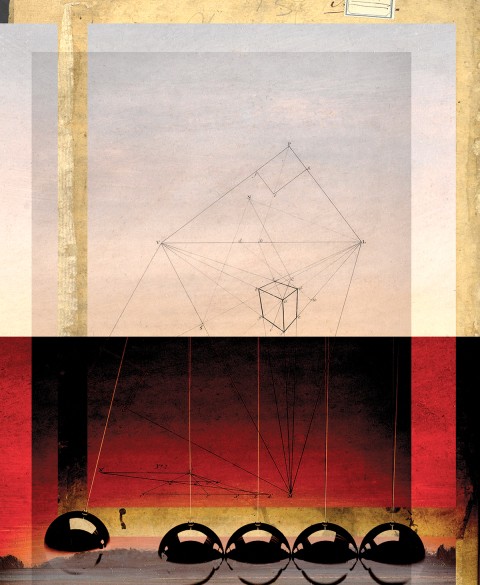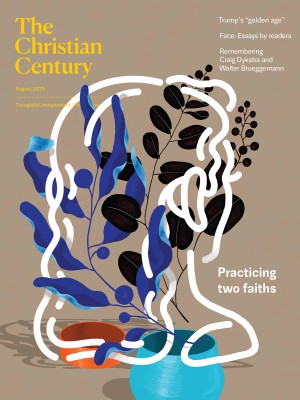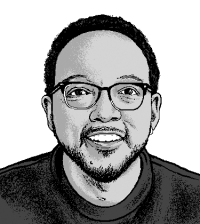
Century illustration (Source images: Creative Commons)
In the summer of 1981 in Los Angeles, five previously healthy gay men all mysteriously began to present with symptoms of pneumonia, and all of them died. Stunned and curious, the medical community set out to know more about the virus that had attacked and eventually destroyed their immune system. The initial conclusion? This was, according to a San Francisco newspaper, “gay men’s pneumonia,” and any gay man experiencing shortness of breath should go see his doctor immediately.
We didn’t know enough. But that wasn’t the main problem.
Within a year we went from calling AIDS “gay cancer”—this really happened, and it wasn’t meant as a slur—to more fully understanding the disease, its causes, and disastrous effects. Magic Johnson’s story helped us understand that it wasn’t strictly a “gay man’s disease” either, that there was something called HIV that was AIDS except not exactly, and that, on the whole, if you were rich you could beat this thing. We’ve learned a lot since 1981, and we’re still learning. But nothing significant or especially public was done in those days to reduce the stigma of those living with HIV/AIDS. In biblical terms, all we did with our knowledge was create the pool of Bethesda and determine who should be there.
Read our latest issue or browse back issues.
We learned more. And yet the problem got bigger.
In my last column I quoted Goethe: “Knowing is not enough; we must apply. Willing is not enough; we must do.” I come to this quote understanding that the uncritical collection of data can have disastrous effects. We knew about HIV/AIDS, and all it did was make us more afraid. Once people knew they had the virus, they weren’t necessarily prone to safer behavior, a point borne out both by the data and by confessions from within the community. Knowledge, however critical, was clearly only a fraction of the solution, which frankly still eludes us. There was even a 2004 campaign in Lesotho called “Know Your Status,” which organizers and advocates now see as having mixed results. It provided an important entryway to testing, but the at-risk populations the campaign aimed to reach weren’t really impacted at all.
But if everybody knows, that’s a good thing, right? Of course it is, but the Goethe quote still haunts me. The reality is that it’s not that hard to learn about what’s threatening the human experiment right now. Racism, capitalism, militarism—there are libraries of content ready to teach us, to engage us, and to humor or outright shame us if necessary into a better way. But what have we done with that knowledge?
For all we know about racism—and Whiteness, and coded language, and implicit bias—how are we doing at applying it? We certainly know more than we used to, and we have successfully delivered the world’s greatest collective guilt trip. But where is the healing? As a Black man I can tell you that me and mine need us all to go much, much farther than being able to identify racism, even within ourselves. For the beloved community to exist as more than just a cool idea progressives talk about, we need to apply this knowledge.
There is something necessary for our redemption as humans that isn’t being unlocked by our knowing more or by our wanting and willing to see things better. As we go about teaching and curing the world of whatever particular ignorance is ours to cure, we have to go beyond the teaching moment. What happens next? What new ethic and necessary change come with this knowledge? Every enlightenment should present both a relief and a new burden.
The road is not easier now that I know how bad capitalism is. It’s much more complex now that I know I shouldn’t shop at [insert company where I love to shop], and sometimes still shop there. I frequently wish I had a set of alternatives and didn’t feel judged when I question their viability. The enlightened have no patience with the ignorant. This is another obstacle that knowledge creates and we have to deal with.
My dream for the church is that we will internalize the example of recent “economic fasts for justice,” which took the idea of repentance and put it in concrete terms (“Shop here, not there, and here’s why”); that we will do more than talk about mental health but actually provide access to therapy; that we will compound our commitment to anti-racism work by coming up with lists of things we will and will not do anymore and why. This will all require an entirely different alignment of our resources and partnerships, along with a level of humility that’s in conflict with the know-it-all preacher many of us present as or desire to become. In the truest sense of the word apply, it would mean testing our newfound wisdom with a set of new practices, which would turn our houses of worship into laboratories instead of dogmatic storage units. It would require us to ask, “So, what now?” about everything we say—a dangerous proposition that has the potential to reveal the bulk of our words and commitments as empty.
The Know Your Status campaign wanted the young citizens of Lesotho first to know—a critical step—and then to change their habits to protect others. It only sort of worked, and a young African nation is tragically learning the limits of knowledge. Too much information and not enough vision for the future can have devastating effects. Let us be careful in what we teach, lest we find ourselves seduced by knowledge of the disease more than a faithful pursuit of the cure.






